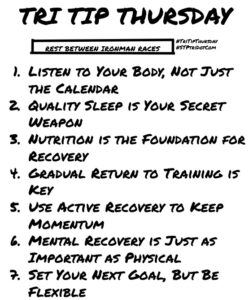
Crossing the finish line of an IRONMAN is an incredible achievement. The months of training, the early mornings, the sacrifices—they all come together in that one triumphant moment. But what happens next? You might feel unstoppable, ready to tackle another race right away. However, to truly unlock your best performance, the time you spend recovering is just as important as the time you spent training. Recovery isn’t about slowing down—it’s about rebuilding, refueling, and getting ready for the next challenge. In these tips, we’ll dive into the crucial steps you need to take between IRONMAN races to ensure your body and mind are not just ready for the next race, but ready to crush it. From listening to your body’s signals to the importance of quality sleep and smart nutrition, we’ll cover everything you need to know to recover like a pro. Whether you’re an IRONMAN veteran or gearing up for your next race, these tips will help you bounce back stronger, faster, and more prepared for whatever comes next.
Listen to Your Body, Not Just the Calendar
Imagine you’re driving a car on a long trip. If you push too hard without stopping for gas, you’ll break down. The same goes for your body after an IRONMAN race. Sure, the race date may be over, but your body’s engine—muscles, bones, and mind—needs time to refuel. Recovery is like stopping at a gas station. Some days, you might need more rest, while on others, a light workout might be just enough. Pay attention to how your body feels, not just what your training plan says. Even though your race may be done, your body is still running its own race—the race to rebuild and repair. Ignoring soreness or fatigue is like driving on an empty tank, hoping you’ll make it to the next stop. The truth is, every body is different. What worked for your friend might not work for you. Listen to your own signals, not someone else’s. It’s not just about taking days off, but about recognizing when your body needs more time to bounce back. Remember, rest isn’t laziness; it’s a crucial part of becoming stronger and faster.
Quality Sleep is Your Secret Weapon
Think of sleep as a magic potion that helps your body rebuild stronger after a race. After an IRONMAN, your muscles are like a jigsaw puzzle that needs to be put back together. Quality sleep is what helps all the pieces fit perfectly. Instead of staying up late or waking up too early, give yourself the chance to sleep deeply. It’s during sleep that your muscles repair, your brain recharges, and your energy levels get a serious boost. Think of it this way: skipping sleep is like trying to run a marathon without drinking water. You wouldn’t do it, right? Sleep is when your body does its best repair work, knitting together all the tiny tears in your muscles and refreshing your tired brain. During deep sleep, your body releases growth hormone, which is essential for recovery. Without it, you’re like a phone with a dying battery—barely holding on. Make your bedroom a sleep haven: dark, cool, and quiet. And remember, it’s not just about quantity but quality. A good night’s sleep is the cheapest, easiest, and most effective recovery tool you have.
Nutrition is the Foundation for Recovery
Picture your body as a house that needs a strong foundation to stand tall. After a tough IRONMAN, the right foods become that foundation. Eating healthy carbs, proteins, and fats is like laying bricks that help your muscles rebuild. Skipping meals or eating junk food is like building on sand—eventually, the house will crumble. Stick to whole foods, hydrate well, and fuel your recovery with smart choices. After an IRONMAN, your muscles are craving the right nutrients to heal and grow stronger. Think of protein as the bricks that rebuild your muscles, carbs as the mortar that fuels your energy, and fats as the insulation that keeps everything running smoothly. Don’t forget about hydration—it’s the cement that holds everything together. If you don’t refuel properly, it’s like leaving the job site half-done. Choose colorful fruits and veggies to get essential vitamins and minerals. Aim for lean proteins like chicken, fish, or plant-based options to repair those muscle fibers. And remember, recovery nutrition isn’t just about what you eat right after the race—it’s about consistently feeding your body the right stuff in the days and weeks that follow.
Gradual Return to Training is Key
Returning to training after an IRONMAN isn’t like jumping into a pool. Instead, think of it like dipping your toes in the water first. Start with light activities—like swimming, easy cycling, or yoga—that let your body stretch out and get back in motion. Over time, gradually increase the intensity. Jumping back into intense workouts too soon is like diving into deep water without checking the depth—you could end up in trouble. Your body just went through a major ordeal, and it needs time to adjust. Think of your muscles, joints, and even your mind as a delicate machine that needs to be fine-tuned after such a long and grueling race. Begin with short, easy workouts that feel more like stretching than training. This is not the time to chase new personal records. Instead, focus on maintaining mobility, reducing stiffness, and reintroducing your body to movement. Each week, add a little more intensity, but always listen to how your body responds. If something feels off, don’t push through it. Recovery is about rebuilding your strength, not rushing back to where you were.
Use Active Recovery to Keep Momentum
Imagine your muscles are like rubber bands that have been stretched during your race. If you just sit still, they’ll snap back too quickly, causing tightness and soreness. Active recovery—like gentle walking, stretching, or easy swimming—helps those rubber bands slowly return to their normal length. This way, you keep the flexibility and strength you’ve gained, instead of feeling stiff and sore. After an IRONMAN, your body needs to cool down, but that doesn’t mean you should just flop on the couch. In fact, staying completely still can make you feel even more tired and sore. Think of active recovery as the cool-down lap after a big race—necessary for bringing your body back to a balanced state. Light activities keep your blood flowing, which helps flush out toxins that build up during intense exercise. It’s like giving your muscles a gentle massage from the inside out. You can also try activities like yoga, which not only stretches out tight muscles but also calms your mind. Even a short, easy walk can do wonders for your recovery, keeping your body limber and your spirits high.
Mental Recovery is Just as Important as Physical
After a grueling IRONMAN, your mind might be as tired as your body. It’s like finishing a big exam—your brain needs a break too. Give yourself permission to step away from training and racing for a while. Spend time with family, pick up a hobby, or just relax. This mental break helps you come back more focused and motivated, rather than feeling burned out. Imagine training your mind as if it were another muscle. After an intense race, it needs time to rest, recharge, and get ready for the next challenge. Your mental stamina was tested just as much as your physical endurance during the IRONMAN. So, take a break from the constant focus and pressure. Use this time to do things that make you happy and relaxed, whether it’s reading a book, hiking in nature, or even catching up on movies you’ve missed. This downtime is crucial because it prevents mental fatigue from turning into burnout. When you finally get back to training, you’ll be more eager and ready to tackle the next goal, with your mind as sharp as ever.
Set Your Next Goal, But Be Flexible
Having a new goal is like planning your next adventure. But just because you want to climb a mountain doesn’t mean you should do it right after hiking a marathon. Take time to recover, then set your sights on the next race. However, be flexible with your timeline. If your body needs more time, it’s okay to adjust your plans. Remember, the goal is to perform at your best, not just to race as soon as possible. When you’re driven by big dreams, it’s tempting to jump straight into the next challenge. But racing is not just about crossing the finish line—it’s about being in top form when you get there. That’s why patience is key. Rushing your recovery can lead to injuries that might take even longer to heal. Setting a new goal gives you something to look forward to, but it should never come at the cost of your well-being. Create a flexible plan that allows for adjustments based on how your body is responding. A smart approach to goal-setting after an IRONMAN includes buffer time, so if you need extra days or weeks, you’re not stressed out. Your body will thank you when it’s ready to perform at its peak again.
Recovery isn’t just a break between races; it’s the key to unlocking your best performance. By giving your body and mind the time they need to heal, rebuild, and recharge, you’re setting yourself up for success in your next IRONMAN. Remember, listening to your body, prioritizing quality sleep, fueling with the right nutrition, and easing back into training are all crucial steps in this process. Recovery is a journey, not a race, and taking the time to do it right will make you a stronger, faster, and smarter athlete.
Now it’s your turn to put these tips into action. Reflect on your own recovery routine and see where you can make improvements. Don’t rush—respect the process. Remember, the path to greatness is not just about how hard you train, but how well you recover.

